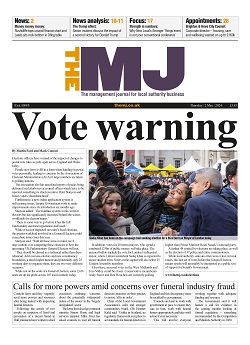It’s local elections season, where the nerves, excitement and hopes of candidates across the country reached the apex after months of trudging the streets.
Councils will be welcoming new politicians who are eager to get started, but also saying goodbye to a cohort that feels deflated, defeated and broken. In the age of polycrisis, our local leaders will need to deliver against the greatest challenges of our time.
Being a councillor was never easy, but in the 2020s this arguably feels the most difficult time to be a locally elected official. No money, exhausted staff, creaking infrastructure, a cost of living crisis and structural societal problems simmering for decades have now well and truly erupted.
Working towards net zero and solving climate change, traditionally seen as something a bit fringe, now needs to be front and centre of any town or city’s plans.
Local authorities are on the frontline of the changes needed, but are increasingly seeing significant pushback, with a worrying new trend of misinformation campaigns targeted at councillors up and down the country.
Many councillors at local authorities that have taken – or plan to take – decisive action to reduce motor traffic congestion through policies such as Clean Air Zones, bus filters, low-traffic neighbourhoods, and school streets will have stood this year against single-issue candidates opposed to these measures – and all traffic reduction schemes.
As the membership and insights director of the UK100 network of local leaders committed to ambitious net zero and clean air action, I know there is a broad cross-party consensus on the need to tackle transport’s contributions to the air quality public health crisis and climate crisis. It is disappointing to see candidates standing on platforms opposed to policies designed to make streets safer, cleaner and greener for communities across Britain. But the democratic process helps to flush out those who claim to speak for the unheard many. These candidates are a good test of what the voting public feels about these issues on a ward basis.
Although polling support for these measures suggests mainstream political candidates will have beaten them at the ballot box, the looming shadow of this pushback will not be so easily forgotten.
The rise of misinformation and conspiracy theories have been used by a handful of candidates to support their opposition to local transport measures. The widespread ‘15-minute city’ misinformation campaign in particular emulates tactics imported straight from the US and is firmly rooted in the anti-vaccine conspiracy theories that circulated at the height of the Covid pandemic.
From death threats in Oxford to vandalism in Rochdale, councils have seen real-world impacts from the kinds of misinformation campaigns propagated by a small number of campaigners. And it was their experiences that I had in mind when I agreed to be a part of the unfortunately named Road Wars episode of the BBC’s Panorama programme dedicated to this topic.
In my interview on that programme I said it is crucial to acknowledge people may have legitimate concerns about traffic measures and it does not mean they are conspiracy theorists.
There are more than two extreme positions on measures like cycle lanes and low-traffic neighbourhoods. These topics are complex and nuanced – it isn’t just human bollards on one side and the far right on the other – over-simplifying the issue inflames the culture wars.
It is not the local residents concerned about their communities turning to death threats or disrupting local meetings. But these rare occurrences show how local debate can be hijacked and poisoned by outside elements who knowingly peddle conspiracy theories designed to anger and frighten communities. But we cannot escape the fact that they are well-organised and know how to dominate media coverage, take the reporting on traffic measures in Oxford, as an example.
Deliberate misinformation is one of the biggest barriers facing local leaders who want to move further and faster to decarbonise transport in their areas and accelerate net zero action, according to the findings of UK100’s recently released Powers in Place: The handbook of local authority net zero powers.
To protect the decisive action and progress already made on net zero, newly-elected councillors and local leaders need to steel their resolve, rise above the noise and step up, not down from, their ambitions.
But, as Powers in Place makes clear, something does need to change. And that means learning some painful lessons, namely: to properly engage communities and businesses in the future design of their places.
‘We do engage’ is usually the response from councils, but far too often it is perceived as a tick-box exercise locked away on an impenetrable corporate website. This defence will not inoculate your area against misinformation. Councils need to be ready for the debate and their politicians need to drive towards co-design of schemes with local residents and businesses, not thrust change upon them.
Christopher Hammond is director of membership and insights at UK100 and the former leader of Southampton City Council
@UK100_



